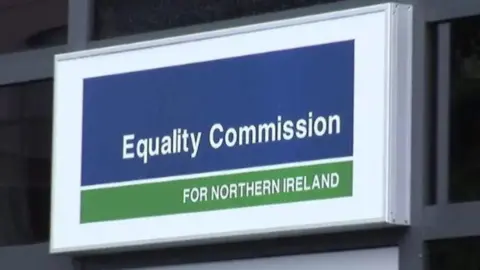
BBC News Nor Political Reporter
 Liam McBurney/PA
Liam McBurney/PADozens of Northern Ireland Assembly members are recruiting staff in a way that could risk claims of unlawful discrimination, a BBC News NI investigation has found.
They include First Minister Michelle O’Neill, as the “essential criteria” for some jobs in her constituency office suggested applicants should hold certain political beliefs.
Recruitment guidance issued to members of the legislative assembly (MLAs) says they should give “equality of opportunity to all candidates irrespective of… political opinion”.
The Equality Commission for Northern Ireland said that, while there are “exceptions” in employment law, the job ads could be “open to a claim for unlawful discrimination”.
 Liam McBurney/PA
Liam McBurney/PAAn assembly spokesman said MLAs are given “advice on best practice” and “it is for each MLA to appoint employees on merit after a fair and open competition”.
Sinn Féín said staff are employed by MLAs to “pursue their priorities for constituency and assembly business”, and “these priorities may legitimately be influenced by their own political perspective”.
MLAs claimed more than £8m in expenses in 2023-24 for constituency office staffing costs including wages.
The job ads and criteria for almost 300 constituency office posts were examined by BBC News NI.
The documents for many of them stated that applications were welcomed from “all backgrounds” regardless of “political opinion”.
Some said candidates should have an “understanding of” the objectives or values of the MLA’s political party.
But others suggested applicants must hold those political beliefs.
Most of those jobs were with Sinn Féin MLAs.
In the “essential criteria”, they said candidates should have a “strong” or “proven commitment to Sinn Féin’s values”.
This included posts with Michelle O’Neill, the party’s deputy leader.
Some jobs with MLAs for the Ulster Unionist Party (UUP) and Social Democratic and Labour Party (SDLP) had similar wording.
Caseworker jobs in former UUP leader Doug Beattie’s office said candidates needed a “strong commitment” to the party’s values.
Some jobs for Cara Hunter also said candidates should have a “strong commitment to SDLP principles and values”.
Belfast-based employment solicitor Cormac Rice expressed concern over job vacancies being “contingent upon a predisposition towards a specific political persuasion”.
He said it “may undermine equality of opportunity and the need to ensure that the best candidate is appointed”.

Stormont’s “best practice guidance” issued to MLAs for recruitment of their office staff advises that “equality of opportunity is integral”.
It said recruitment should be “solely on the basis of merit” and provide “equality of opportunity to all candidates”, irrespective of protected characteristics including gender, religion and “political opinion”.
The Equality Commission said all employers must “operate within our equality laws”.
“Any employer who states or implies in a job advertisement that an applicant must hold, or not hold, a particular political opinion to be eligible for the role, may leave themselves open to a claim for unlawful discrimination,” a spokeswoman said.
However, she said the Fair Employment and Treatment (NI) Order 1998 “includes an exception in relation to political opinion” where the “essential nature of a job requires it”.
“We advise employers to contact us for advice before publishing job advertisements that rely on this exception,” she added.

A Sinn Féin spokesman said: “Every MLA is resourced to employ staff to support them to serve their constituents and pursue their priorities for constituency and assembly business.
“These priorities may legitimately be influenced by their own political perspective.
“MLAs can seek HR support from the institution to ensure fair and consistent recruitment processes that promotes equal opportunities.”
An assembly spokesman said MLAs employ staff to support their work.
“This is distinct from support that may be provided centrally by their political party,” he added.
“Guidance published to MLAs by the Assembly Commission provides advice on best practice in recruitment, including the need to ensure that no unlawful discrimination occurs when making employment decisions.
“Taking this guidance into account, it is for each MLA to appoint employees on merit after a fair and open competition.”
The UUP was approached for comment.
The SDLP said it “remains committed to ensuring a fair and transparent process for all job applicants and appointments are made solely on merit”.
“We are confident we have upheld these principles throughout,” a party spokesman added.
‘Social media officers’
The recruitment documents were obtained through Freedom of Information requests.
They also give an insight into who is being recruited by MLAs, and the kinds of jobs being advertised.
Eleven of the 90 MLAs have declared employing family members.
More than 60% of the staff recruited since May 2022 were members of their MLA employer’s political party.
Many of the jobs advertised have titles such as constituency caseworker, manager or policy adviser.
Nearly 50 had “communications” in their title, while a further 19 were “social media officers”.
Pat McCartan, a former member of an independent Stormont panel which set rules on MLA expenses, expressed concern about some of the job titles.
“It’s very far removed from assisting people with their constituency enquiries,” he said.
“They’re not paid to be extra party workers.”
Mr McCartan said there was a need for a “serious audit of the financial arrangements”.
An assembly spokesman said MLAs employ staff for “a range of roles such as casework, research and communications”.
“This is distinct from support that may be provided centrally by their political party,” he added.
He said staff support MLAs “to serve their constituents and pursue their priorities for constituency and assembly business”.
“Those specific priorities will differ for each member and may be naturally influenced by their political perspective.”




